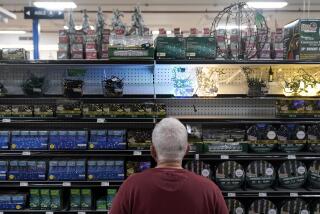THE ECONOMY : U.S. Factory Orders Fall Steeply in July : Manufacturing: Drop of 2.1%, led by transportation and non-durable goods, is highest in 18 months.
- Share via
WASHINGTON — Orders received by American factories took their steepest tumble in more than 1 1/2 years in July, the Commerce Department said Thursday, the latest sign of an industrial sector at a standstill.
The 2.1% drop in orders to a seasonally adjusted $250.15 billion followed a revised 2.9% gain in June orders. It exceeded economists’ expectations of a 1.7% decline in business.
The fall was the sharpest decrease in orders since a 3.6% drop in December, 1991, department officials said.
Weakness was concentrated in transportation goods such as cars and airplanes, but it also cut across the spectrum to include non-durables such as food.
“There’s not a lot of evidence that we’re losing ground, but we’re not gaining either,” said economist Robert Dederick of Northern Trust Co. in Chicago. “Manufacturing is just in a sideways shuffle.”
Part of the problem is stagnant overseas growth. Germany and Japan are mired in slumps and cutting back on purchases of U.S.-made goods. Aggravating the situation is a healthy appetite among U.S. consumers for imported goods.
“It seems like consumers are spending all that they can possibly spend,” said Cynthia Latta, an economist with DRI/McGraw Hill Inc. in Lexington, Mass. “But they’re just not spending on goods made in the U.S.”
Transportation orders plummeted 16.7% in July, more than wiping out June’s gain of 14.5%. Excluding transportation goods, factory orders in July were up a slight 0.2% after a 1.2% increase in June.
Separately, the Labor Department said applications for state unemployment benefits fell by 7,000 last week from the preceding week, to 324,000.
But Latta noted that good-paying jobs in manufacturing are under pressure.
“Employment prospects in factories are not good in the best of times because of rising productivity and stiff foreign competition,” she said. “We’re not likely to see any pickup in manufacturing employment soon.”
The Commerce Department reported Aug. 25 that orders for long-lasting durable goods, which account for about half of total factory business, dropped 3.8% in July. It revised that in Thursday’s report to show a smaller decline of 3.1%.
But orders for non-durable goods--such as food, tobacco and paper products that are used up quickly--also fell in July, down 1% after a 1.4% rise in June.
Manufacturing softness continued into August.
Overall inventories of goods at all levels of production were unchanged in July, but finished-goods inventories increased in a reflection of slower retail demand.
Dederick said piled-up stocks of unsold goods from the second quarter were proving hard to work off and were slowing down a manufacturing recovery.
Factory Orders
Total new orders in billions of dollars, seasonally adjusted:
July 1993: 250.2.
Source: Commerce Department
More to Read
Inside the business of entertainment
The Wide Shot brings you news, analysis and insights on everything from streaming wars to production — and what it all means for the future.
You may occasionally receive promotional content from the Los Angeles Times.










